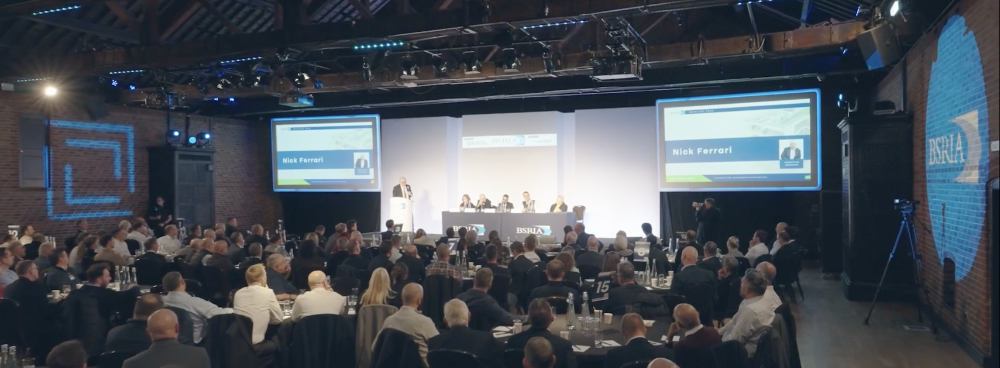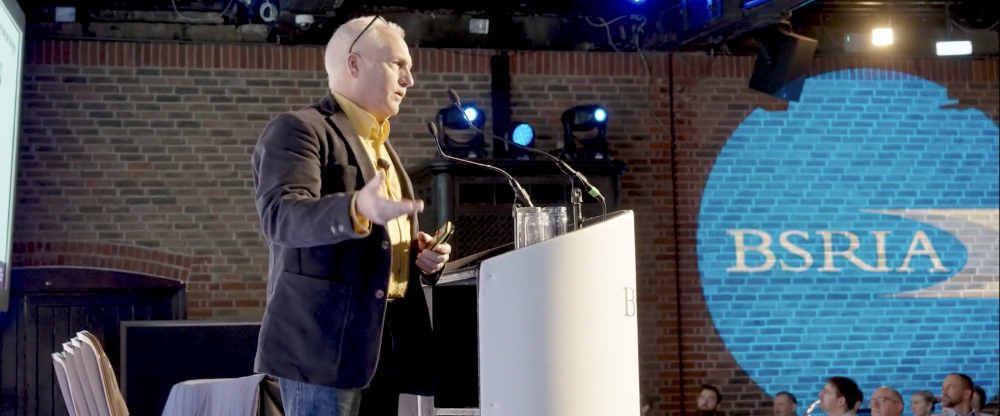Key takeaways from the BSRIA Briefing 2024
[edit] “Not just waiting for Net Zero, but driving it”
- Baroness Brown of Cambridge, Chair of the Carbon Trust, delivered a keynote speech on climate-resilient buildings
- She said: “We must close the performance gap on buildings, taking building standards as a minimum. Reaching Net Zero is no longer enough – we have to adapt our buildings to avoid uninhabitable homes.”
Last week, professionals from across the construction and building services industry gathered at the 2024 BSRIA Briefing.
Hosted by the Building Services Research and Information Association (BSRIA) at the Brewery, London, the event brought together some of the most important voices in building quality and sustainability to address the critical challenge of delivering buildings that can achieve Net Zero by 2050.
It examined retrofit as a key theme, outlining the importance of future-proofing our buildings and providing healthy and comfortable spaces for people to live and work, opening people's imaginations to approach retrofit differently. As in previous years, the Briefing showcased expert insights and real-world case studies to inspire action in transforming the UK’s ageing building stock from both a physical and behavioural standpoint.
Speaking at the event, Dame Julia King (Baroness Brown of Cambridge), Chair of the Carbon Trust, emphasised the urgent need to strengthen our buildings for the realities of a changing climate, warning that rising temperatures, increased flooding, and water shortages are inevitable. She called for a tripling of decarbonisation efforts and highlighted the need for climate-resilient design to prevent uninhabitable homes and worsening fuel poverty.
The day was grounded in independent research undertaken by BSRIA and revealed by journalist and broadcaster Nick Ferrari at the event - that 82% of consumers are unclear on retrofit as a solution. “It suggests a certain amount of apathy”, he said, kicking off a Q&A panel about the practical steps toward greater understanding of retrofit and better energy literacy.
The conference also highlighted the critical role of retrofit assessments, with Richard Fitton, Professor of Building Performance at the University of Salford and Chairman of the upcoming British Standard for Retrofit Assessment, presenting the BS:40104 standard. This new standard is set to improve the quality of retrofit work by introducing a robust, comprehensive evaluation process.
Talks throughout the day also stressed the importance of tailoring solutions to homeowners and occupiers. Dr Sanchayan Banerjee spoke about the need for personalised approaches, using behavioural data to encourage adoption. Meanwhile, WSP’s Joe Benson highlighted the social and economic benefits of retrofit projects, from improving indoor air quality to empowering communities.
The event also explored the digital future of buildings, with Justin Kirby from the Digital Buildings Council discussing how smarter systems and frameworks like NABERS UK (a rating system used to assess the energy efficiency and environmental impact of buildings) can optimise performance and reduce emissions.
A recurring theme throughout the day was better collaboration amongst industry, government and occupants. Recommendations included updating standards, integrating climate considerations across policies, and bridging skills gaps to drive progress.
The conference reinforced the urgent need to retrofit the UK’s 29 million existing buildings to align with Net Zero goals, while also ensuring solutions are equitable, sustainable, and adaptable to future challenges.
Lisa Ashworth, CEO of BSRIA, reflected on the event, saying "Addressing the performance gap in buildings is as crucial to the built environment as the very materials that shape it. We can no longer afford to wait; getting things right from the start is essential, as the cost of failure is too high. That’s why events like the Briefing are so important—they offer professionals across the sector the chance to exchange innovative practices and gain valuable insights that they can apply in their daily work.”
"As BSRIA nears its 70th anniversary, we reflect on our progress and, more importantly, on the path ahead. Now is the time to drive meaningful change, and BSRIA is proud to be doing our part to help the industry raise standards and ensure buildings perform as intended, benefiting both people and the planet."
"At BSRIA, we’re not just talking about sustainability; we’re taking real action. We’re leading by example, retrofitting our own office spaces to showcase how existing buildings can be improved for greater efficiency, creating a better environment for all."
For more information on BSRIA and to catch on-demand talks from the day, click here
This article was issued via Press Release and appears on the BSRIA news and blogsite as 'Not just waiting for Net Zero, but driving it”: Key takeaways from the BSRIA Briefing, dated 28 November, 2024.
--BSRIA
[edit] Related articles on Designing Buildings
- Alteration work.
- Bill Gething and Katie Puckett - Design for Climate Change.
- Bonfield Review.
- BSRIA articles.
- BSRIA Briefing 2024: Sustainable Futures. Redefining Retrofit for Net Zero Living.
- BSRIA Briefing 2023. Cleaner Air, Better Tomorrow
- BSRIA Briefing 2022 - from the outside looking in
- BSRIA Briefing 2021
- BSRIA Briefing 2019: A climate of change
- BSRIA briefing 2018
- BSRIA Briefing 2017
- BSRIA briefing 2016
- BSRIA 2024 North America BACS software & services market study.
- BSRIA Handover Information and O&M Manuals guidance.
- Definitions of retrofitting.
- Digital Twins, A BSRIA Topic Guide TG25 2024
- Energy efficiency of traditional buildings.
- Energy efficiency retrofit training videos.
- Energy Performance Certificates.
- Fabric first.
- Government urged to include home energy retrofits in Industrial Strategy.
- Home Energy Masterplan.
- Households Declare.
- How to deal with retrofit risks.
- LETI publishes Climate Emergency Retrofit Guide.
- National Refurbishment Centre.
- National Retrofit Hub.
- National Retrofit Strategy NRS.
- New energy retrofit concept: 'renovation trains' for mass housing.
- PAS 2035.
- PAS 2038:2021 Retrofitting non-domestic buildings for improved energy efficiency.
- Recent study of UK households reveals chilling home truths.
- Refurbishment for net zero; the BSRIA white paper
- Renovation v refurbishment v retrofit.
- Retrofit and traditional approaches to comfort.
- Retrofit coordinator.
- Retrofit, refurbishment and the growth of connected HVAC technology.
- Retrofitting solar shading.
- Shallow retrofit.
- Step-by-step retrofit.
- The Each Home Counts report and traditional buildings.
- Whole house approach.
- Whole house retrofit plan.
Featured articles and news
Gregor Harvie argues that AI is state-sanctioned theft of IP.
Many resources for visitors aswell as new features for members.
Using technology to empower communities
The Community data platform; capturing the DNA of a place and fostering participation, for better design.
Heat pump and wind turbine sound calculations for PDRs
MCS publish updated sound calculation standards for permitted development installations.
Homes England creates largest housing-led site in the North
Successful, 34 hectare land acquisition with the residential allocation now completed.
Scottish apprenticeship training proposals
General support although better accountability and transparency is sought.
The history of building regulations
A story of belated action in response to crisis.
Moisture, fire safety and emerging trends in living walls
How wet is your wall?
Current policy explained and newly published consultation by the UK and Welsh Governments.
British architecture 1919–39. Book review.
Conservation of listed prefabs in Moseley.
Energy industry calls for urgent reform.
Heritage staff wellbeing at work survey.
A five minute introduction.
50th Golden anniversary ECA Edmundson apprentice award
Showcasing the very best electrotechnical and engineering services for half a century.
Welsh government consults on HRBs and reg changes
Seeking feedback on a new regulatory regime and a broad range of issues.
CIOB Client Guide (2nd edition) March 2025
Free download covering statutory dutyholder roles under the Building Safety Act and much more.





























